Any day now, the U.S. Supreme Court is expected to issue rulings in a pair of landmark cases Students for Fair Admissions (SFFA) has brought forth against Harvard and the University of North Carolina, alleging that their race-based college admissions practices actively discriminate against high-achieving students who don't fit the woke mold, often Asian American applicants.
Townhall has conducted a series of sitdown interviews, in the lead-up to the much-anticipated SCOTUS decisions, with Asian American community members outraged over the Ivy League's racial gatekeeping and affirmative action's trickle-down effects, now seeping into suburbia. As an affront to the race-obsessed Left's forever war on meritocracy, and in unyielding defense of the American Dream, which we, like many, believe is well worth fighting for, here are their firsthand accounts from the frontline:
Jon Wang, Harvard University reject now-attending the Georgia Institute of Technology
Harvard hopeful Jon Wang, currently a freshman at Georgia Tech double-majoring in mathematics and computer science, was rejected by the Crimson's guard despite submitting a near-perfect SAT score. Achieving an elusive 1590, just 10 short of the total possible points, Wang outperformed 99 percent of all other test-takers, which also meant he placed among the top 1 percent.
"It's harder to gain acceptance as an Asian American..." Wang, remaining "cautiously optimistic" at the time, recalled his high school counselor telling him, in essence. "They didn't really give me much advice other than to try to appear a bit less Asian."
For example, Wang said, "Don't write your essays about Chinese traditions or things commonly associated with Asian culture."
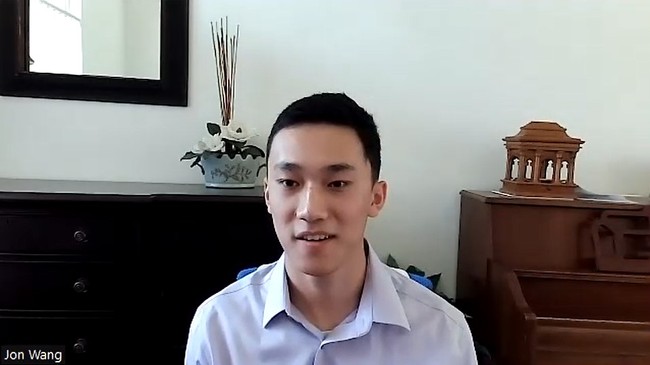
Jon Wang | via Zoom interview (May 12, 2023)
On paper, Wang was surely a shoo-in for the Ivies: Aside from graduating with a 4.65 GPA, extracurriculars-wise, he was captain of the academic QuizBowl team, a competitive golfer, making headlines at junior tournaments across the country, and co-founded a start-up company that provides golf-data analytics to the Chinese market via an app he had developed the backend code for.
"Obviously, race plays a factor in it," Wang stated, noting that based on SFFA's acceptance-percentage model, his approximately 20-percent possibility of being admitted into Harvard as an Asian American would have skyrocketed to a 77-percent chance of admission if he were Hispanic, with the likelihood climbing to 95 percent if his race was black. "The model's results are pretty clear..." Wang said of the calculations. "The fact that I'm Asian—I don't think makes my accomplishments any less valuable."
Shortly after the Harvard-rejection letter arrived, Wang joined SFFA in hopes of changing the racially rigged game for younger college-bound Asian Americans facing the feat soon as well as applicants of the coming generations. "Maybe my kids in the future," Wang, the son of first-generation Chinese immigrants, mused, "so they don't have to deal with unfairness in the system."
Yun-Lung Yang, Montgomery County Public Schools college/career counselor
White Oak Middle School resource counselor Yun-Lung Yang, a veteran advisor who's spent almost over a decade entrenched in the American education system, has been offering an array of academic guidance ranging from career counseling to tactics for navigating the college admissions process. Back when he was working with prospective students at the high school level, Yang advised Asian American college applicants not to denote their racial identity on their applications to avoid hurting their chances.
Recommended
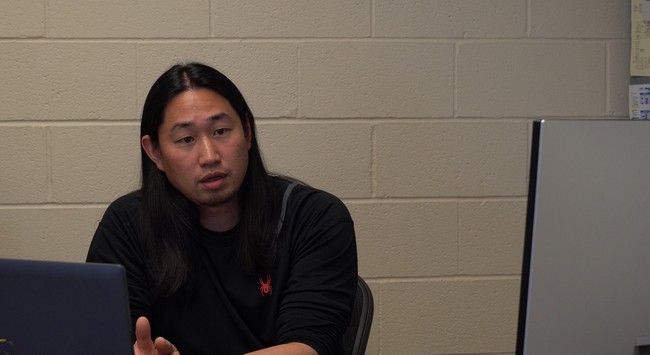
Yun-Lung Yang | via in-person interview (March 15, 2023)
Growing up in an immigrant household, Yang recalled being told, "You're not Caucasian, and you also don't have affirmative action. So, what you need to do is be the best. And if you're the best, they'll pick you." However, he said the times have changed.
"I find myself having to tell students, 'That's no longer the case. Even if you are the best, and you have the best test scores; you have the best grades; you have everything set. But, if you end up circling that you are Asian American on your application, you are kind of shooting yourself in the foot.' It's a very difficult conversation, but I always err on the side of telling my students the truth, the reality," Yang, seated at his desk in the guidance counselor's office, said. "When they respond, they feel very defeated."
From what Yang has been exposed to in K-12 education, he's noticed that while Asian American students are overlooked to fulfill quotas for their black and Hispanic classmates wishing to take higher-rigor subjects, "it's more so a problem of watering down the rigor of the class." Yang elucidated that "in order to promote inclusiveness in the classroom," the course's challenging nature is often "dwindled down" to serve minority students that are, otherwise, "not academically strong enough to thrive in these classes."
When asked if such students are reaching the academic benchmarks they're supposed to meet or flailing on standardized testing, Yang said he has witnessed a swath of straight-A students with abysmal SAT scores in the 800- to 900-range. "That's indicative of grade inflation [...] And a lot of them are struggling and performing poorly. It's not congruent with their grades; it's not matching up. That's a common theme nowadays I'm seeing in regards to student achievement in the county," Yang responded.
The quota-filling has resulted in multiple retakes of exams—two, three, four times—until there's a positive outcome. Day-to-day grading taking a front seat, with midterms and finals being removed altogether, means there's no metric to determine if students have retained the information. "They've simply eliminated every metric, which has turned into subjective measurements," he said.
Yang has seen a pattern of Asians being categorized as "white-adjacent," in terms of data analysis. "They either omit the Asian American student-performance data, instead of asking, 'Why is this group of minorities doing well and what can we learn?', or take a radicalized approach of combining the Asians and the whites as the same data group. Their whole focus is, 'How are we gonna balance out the inequities?' We're literally omitting data to push a certain agenda, and I think that's very, very dangerous."
Recounting a meeting revealing the racial data-grouping, the middle school counselor remembered the moment "everybody was sitting there looking at the chart where they combined the Asian and the white [demographics] in the same data point. Everyone was looking at each other like, 'What the heck is this?' And everybody thought it was wrong, but nobody said anything. If that was the case for any other ethnicity, there would be people hootin' and hollerin' and rioting. Doing all kinds of stuff," Yang stated.
Many optimistic meritocrats in the Asian American community have "blindly accepted that that's going to be the way forward," Yang said. "And as long as you do that," he continued, "that's going to be good enough and you're going to be rewarded for your hard work [...] But, you can't just do the best or be the best, because you're going to be ostracized, regardless, based on the current social-justice political agenda. They have to fight for their own futures. I don't think they can just simply hope for the best."
"Everyone needs to speak up," Yang urged. He noted that since Asian Americans are "culturally reserved" and tend to "not make much of a fuss," that coupled with the collective silence are partly "why this has continued to grow for this long and this extreme."
Of the Asian Americans who haven't entered the fray, "I don't think that they see [affirmative action] as a direct impact to them, especially my generation," Yang said. The typical Asian American upbringing is centered around schooling, Yang explained, in which the parents are "100% devoted" to ensuring their kids excel academically and "engraining a competitiveness in their children to strive to be the best." So, the community views investment in education—at all levels—as an input-output design.
"We have this focus on education because we believe in the American Dream," Yang said. "If you can succeed in school, you will be rewarded with the ability to change your future, change your socioeconomic class. Our families have seen evidence of it and people understand that this is what you do to get out of poverty. We model that as a community and as a racial identity group."
But, when this current generation "comes to that crossroad, they experience straight-up discrimination. Now, we're second-class citizens. You can't compete with other ethnicities that happen to have the same score or even a worse score than you—and you have to be left in the back," Yang countered. "How do I counsel Asian American kids in this day and age? What is their outlook when they apply? I find that conversation not only difficult but also very heartbreaking," he said. "It shouldn't be like that."
"You should be provided with what you can produce," Yang stressed. "I see meritocracy as the focal point of the American Dream. Without that, I don't know what I'm doing here. I don't know what these kids are doing here either. Because they can be the best of whatever, and in the end, have nothing to show for [...] This is going to end up looking more like other developing countries in many ways, where you can work as hard as you want and be as talented as you want, but you don't get any recognition or the fruit of your labor, simply by whatever reasoning or denominations of privilege that people are receiving."
Jeff Hou, Poolesville High School freshman
15-year-old Jeff Hou, a ninth-grader at a public top-ranked Maryland magnet school, where the Advanced Placement (AP) participation is 91% and minority enrollment comprises more than half of the student body, has encountered what it's like to be typecasted in the stereotypical role of an academically gifted Asian student, a go-to stereotype, reinforced by affirmative action policies, Hou asserted, that academia and society at-large frequently reference to hold Asian Americans to a higher standard,
"From these harmful stereotypes, I've been expected to perform better, even when me and someone else who is non-Asian—I've had this happen multiple times—we know the same amount of stuff, but I'm expected to know more," Ho, wearing an SFFA shirt, said. "I'm expected to do better. I'm expected to do things that they're not expected to do, and it's mainly because of my race."
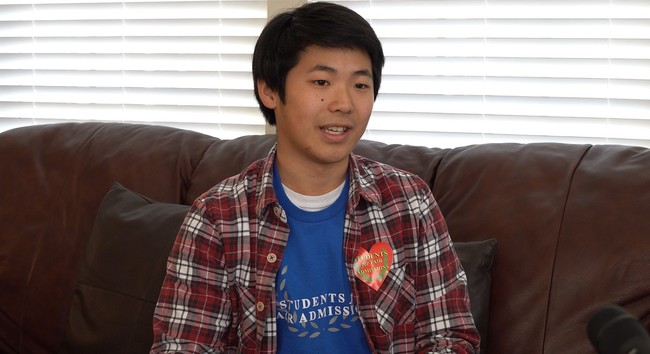
Jeff Hou | via in-person interview (Feb. 11, 2023)Hou contemplated how he'll approach college applications when the time comes. "We should be proud to be Asian Americans. I think everybody should be proud of their own race, but in this society, given the impacts of affirmative action, sometimes you just have to downplay that to get by," Hou said. However, he resolved, "I'm not going to conform to these activists telling me that I should be ashamed of who I am." It's "absolutely immoral," Hou lambasted leftist attempts to suppress Asian American identity.
"As an Asian American, I definitely know, [...] and the whole of America knows, that when I apply for colleges, the College Board will look at me as an Asian American, and I will be at a disadvantage [because] of that," Hou told Townhall, alluding to the open secret that collegiate institutions afford minorities, excluding Asians, preferential treatment, on the basis of race, in the entryway.
"I acknowledge it, but I'm not necessarily fearful. I believe that America will bring justice as the Supreme Court is taking on this case. I believe that the right thing will be done and I believe that America will stay the land of the free and equality," Hou said.
Hou explained how his immigrant parents, who fled the Chinese countryside in search of a better life, aren't part of a privileged class, as the mainstream media tends to portray the average Asian American household, with well-to-do socioeconomic status.
"My parents came from China to escape [...] and they came with one suit of luggage with just clothes, legal documents, and a bit of money. And they come from, basically, nothing to where I am right now in America. They are immigrants. They've worked for everything we have..." Hou said, describing the hardships that his mother and father have overcome to provide for their children. "It is absolutely disgusting how they've worked so hard only for me—to work my hardest, as well—to be at a disadvantage."
Addressing the small, but vocal, subset of "misled" Asian Americans who stand behind affirmative action, Hou asked those supporters to reflect on the statistical disparities. "How can we simply look at this and let this happen to us as Americans—not even [as] parts of the Asian American community, but as Americans—for us to be looked at our race and discriminated against?" Hou questioned, adding, "It is unAmerican and against every single moral, value, and principle of the Asian American community."
"When someone tells you to be quiet to fight for racial justice, I say, 'Are you really fighting for justice when you tell other races to be quiet?' [...] I know that the message for affirmative action is to promote diversity, to fight against racism. But, how are you gonna fight against racism by discriminating against others?" Hou further questioned the pro-affirmative action camp, then stated with conviction: "Yes, there have been past inequalities in America, but the way to remedy that is not through discrimination."
The issue of anti-Asian discrimination in Montgomery County, the Free State's most populous county and a Democrat stronghold where Poolesville is situated, is "downplayed" and "ignored," the first-year student stated. "We're told, basically, to suck it up."
Eva Guo, parent and former Students for Fair Admissions board member
Community organizer Eva Guo, a mother of two school-aged kids and formerly on SFFA's board of directors, said Montgomery County Public Schools (MCPS) is prioritizing checking DEI (diversity, inclusion, and equity) boxes over ensuring the quality of the children's education, especially maintaining academic excellence within the county's Gifted and Talented (GT) programming.
"As a parent, I am concerned about the quality of GT program since they use racial quota as selecting criteria," Guo voiced.
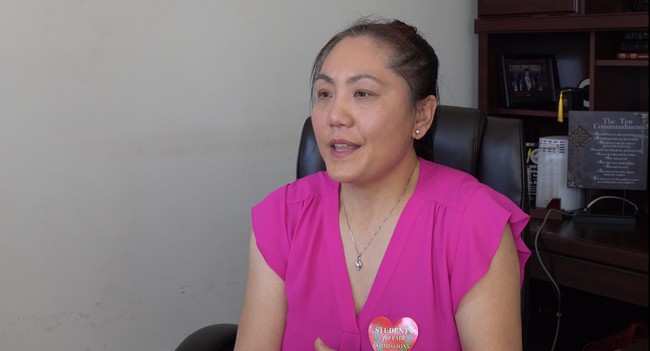
Eva Guo | via in-person interview (Feb. 11, 2023)
Citing a 2016 report MCPS had published on reforming its Gifted and Talented program, when the school administration changed GT selection criteria from merit-based to racial equity, Guo explained: "The reason for this reform was that they thought there were too many Asians in the Gifted and Talented program. As a result of the GT reform, many highly qualified Asian American students have been rejected by the central GT program while non-Asians with much lower GT test scores are accepted."
Specifically, the GT admission rate of Asian students had decreased 20 percent every consecutive year since 2017 in the overhaul's aftermath, Guo said, while other ethnic groups, such as black and Hispanic students, had admission rates soar yearly.
"Lowering the bar does not solve any problems and cannot help close the achievement gap either. In reality, students who were admitted to the GT program merely due to their skin color most likely will fail or drop out of the program since they are unable to catch up with the accelerated pace," said Guo, who had received the 2022 Asian American Coalition for Education (AACE) Outstanding Supporter Award in recognition of her contributions to pursuing equal-education rights for all American children.
Guo, a first-generation immigrant who had balanced raising kids while pursuing a master's degree, revealed that her children have personally experienced anti-Asian discrimination. When her younger son was in third grade, he scored 148 out of 160 on his GT test but was waitlisted and did not get into the program that year while several of his non-Asian peers who scored far lower were admitted. "My son is not alone," Guo said. "He is just one example of many other Asian kids. This is absolutely unfair."
As for Guo's older son, when he applied to college in 2022, although he was an all-round student with a weighted GPA of 4.44 and had completed approximately 1,000 Student Service Learning (SSL) hours (MCPS's graduation requirement was only 75 hours), her child was rejected by several of his dream colleges last year. "Some of his non-Asian schoolmates with much lower GPAs were admitted," Guo continued. "This becomes a new norm under the unfair college admission policies."
Again and again, enraged Asian American parents tried to communicate their concerns with MCPS over its "unlawful" GT admissions practice. "However, our requests fell on deaf ears," Guo stated, "and we have never gotten a clear answer." So, in April 2018, 10 Asian American parents filed separate civil rights complaints to the U.S. Department of Education (DOE)'s Office for Civil Rights (OCR). After Guo contacted the civil rights office several times and talked to then-Assistant Secretary Kenneth L. Marcus, OCR initiated a formal investigation into MCPS a year later over its potential bias against Asian American students.
Back in June 2018, joined together with other Asian American parents, Guo's group formed a 501(c)(3) non-profit organization named Association for Education Fairness (AFEF) to fight for fair GT admissions. To raise more awareness and rally more like-minded parents, Guo organized a community seminar comprised largely of Chinese American descendants, an event that connected her with the Pacific Legal Foundation (PLF), which later on filed a federal lawsuit in 2020 on behalf of AFEF against MCPS. After almost two years of litigation in 2022, AFEF's case was dismissed by the local U.S. district court "without a valid reason," Guo said, "but we never gave up." The plaintiffs filed an appeal to continue the case, as it's pending to be ruled on.
"Diversity does not mean different skin colors; it really means different mindsets, thoughts, and opinions regardless of skin color," Guo declared. Though many Asian American college applicants come from low-income families, Guo said the Chinese believe in the saying: "No cross, no crown." In essence, "lacking resources should never be used as a valid excuse for a student's failure in education," she said. "There are always alternative solutions as long as you are self-motivated and determined to be successful."
"Inspired by their hard-working parents and surrounded by high-performance peers, Asian kids have a desire to be good citizens to their country and role models to their community...Our Chinese believe that everyone shares responsibility for a better society."
Currently, Guo is working closely with other Asian American community leaders across the country and planning to initiate a national organization called Asian Americans For Equality & Liberty (AAFEL), which will rally all conservative and moderate Asian Americans together to address more issues, not only involving education but also employment. The mission of the AAFEL is to advance Asian American communities through protecting our constitutional rights, defending the American Dream, preserving Asian American cultural heritage, and participating in America's democratic process. "America is a big melting pot. No matter where you are from and what languages you speak, we are all Americans. I am very proud of being an American," Guo said.
Jayson Lee, Poolesville High School freshman
Guo's son, 15-year-old Jayson Lee, also exiting his first year at Poolesville High School, called the GT entrance exams there racially biased with standards that fluctuate depending on who's taking the tests. "I have plenty of friends that are non-Asian American who have gotten much lower scores than I have—maybe 10, 20 percent lower—and they got in while I did not," Lee said, referring to when he was in third grade.
"I feel like there are a lot higher expectations for Asian Americans in my magnet program..." the ninth-grade student stated.
Beyond the double-standards, Asian American students have been experiencing blatant bigotry from their peers within Lee's rigorous STEM-styled science, math, and computer science (SMCS) house. "Especially this school year, we've been called out [...] and they've been using some slurs as well," Lee said. The reason for the hostility toward Asians, prevalent not just on school grounds, but elsewhere in America, Lee believes, is establishing a racial hierarchy by "punching down to raise themselves up."
"You don't need to harm others in order to boost yourself," Lee said.
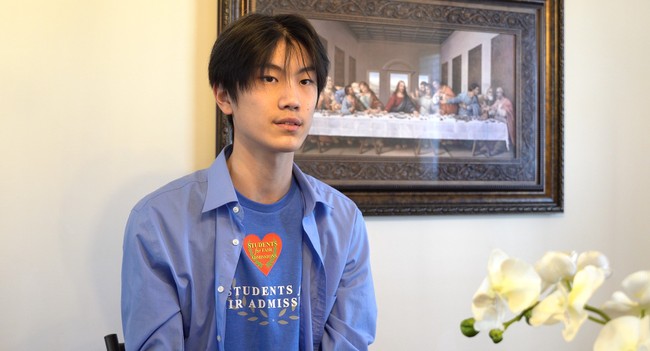
Jayson Lee | via in-person interview (Feb. 11, 2023)Though graduation is still years away for the high schooler, whose heart is set on attending Duke University or Massachusetts Institute of Technology (MIT), he expressed concerns, a disquiet immensely felt by Lee's family, that his dreams could be dashed if the U.S. Supreme Court decides not to side with SFFA in either case, instead, ruling in favor of the institutional powers that be.
Lee said that he knows of some students who had opted out of using their Asian names on their college resumes for fear of, unwittingly, inviting anti-Asian discrimination. "They said that actually affected them a lot and they recommended me to also opt out," Lee went on. When asked if he, too, will follow suit, Lee replied: "That will require some deeper thought, but I will consider it."
"We shouldn't have to de-emphasize our Asian American heritage," Lee, nevertheless, asserted.
Editor's Note: Through affirmative action, the radical left is perpetuating racism and waging war on meritocracy. Help us defend the American Dream.
Help support Mia Cathell's investigative reporting. Join Townhall VIP today and use promo code AMERICANDREAM to get 50% off your VIP membership.
























Join the conversation as a VIP Member